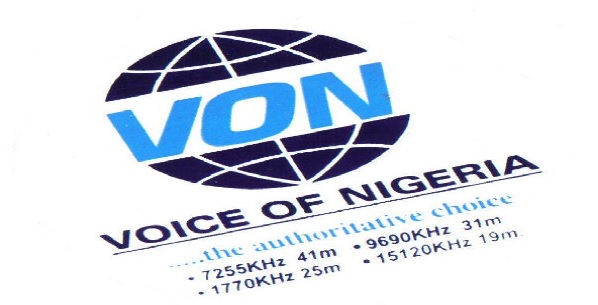Broadcasting
MRA Inducts Voice of Nigeria into FOI ‘Hall of Shame’

Media Rights Agenda (MRA) has named the Voice of Nigeria (VON) into its Freedom of Information (FOI) Hall of Shame, accusing it of failing to promote the FOI Act and ensuring its effective implementation as a public service media organisation as well as non-compliance with its obligations under the Act as a public institution.
In a statement in Lagos, Mr. Ayode Longe, MRA’s director of Programmes, noted that the Voice of Nigeria, as a national radio station established to inform the world on national issues and developments, should ordinarily be at the forefront of promoting the FOI Act and seeking compliance with the provisions of the Law by other public institutions as this would evidently enhance its performance of its statutory functions as well as enable it discharge its duties with greater ease and effectiveness.
He, however, expressed disappointment that the station not only failed to promote the Act or advocate compliance by other public institutions, but has itself refused to comply with its obligations under the Act.
The Voice of Nigeria is the second Federal Government-owned media institution to be inducted into the FOI Hall of Shame since the inception of the programme in 2017, following the conferment of the dubious award on the Nigerian Television Authority (NTA) on September 11, 2017 for similarly failing to promote the Act, ensure its effective implementation and for its non-compliance with its obligations under the Act as a public institution.
The objectives of the Voice of Nigeria, as provided in the Act establishing it, are to project Nigeria’s positive image externally, to inform the world on national and African issues and developments, to change the perspectives of the world on Nigeria and the black world, to unite Africa and the black world and to engender positive contribution of Africans in the Diaspora to the growth and development of the continent.
Mr. Longe said there was no doubt that the institution’s lack of transparency and accountability had eroded public trust and confidence in it, which would affect its credibility and ultimately, its ability to deliver on its statutory mandate.
According to him, “being a national radio network broadcasting in seven languages, including English, Yoruba, Hausa, Igbo, French, Arabic, Kiswahili and Fulfulde, the Voice of Nigeria is uniquely positioned to overcome the language limitation that most other media organizations have and be able to promote the Act among Nigerians of different linguistic backgrounds. Instead, this national broadcaster has itself been consistently in blatant disregard of its statutory duties and obligations as a public institution covered by the Act, thereby undermining its implementation and effectiveness.”
Mr. Longe stressed that “all public institutions established by Law, including the Voice of Nigeria, are expected to proactively disclose certain types of information listed in Section 2(3) (a) to (f) of the FOI Act, by various means including print, electronic and online sources. But the Voice of Nigeria has not fulfilled its proactive disclosure obligations under Section 2 of the Act as it has not published the itemized categories of information either on its website or anywhere else, as it is required to do by the FOI Act.”
He described the failure of the Voice of Nigeria to designate an official of the institution to whom requests for information by members of the public should be sent as well as its failure to proactively publish the title and address of such an officer as an inexcusable breach of the provisions of the FOI Act, particularly in the light of repeated demands by the Office of the Attorney-General of the Federation issued to all public institutions to appoint such officials and send their details to the Federal Ministry of Justice, which is the coordinating institution for matters related to the implementation of the Act.
Mr. Longe also noted that although Section 13 of the FOI Act requires all public institutions to ensure the provision of appropriate training for their officials on the public’s right to access information and records held by the government or public institutions as well as to ensure the effective implementation of the Act, the Voice of Nigeria had not organized any such training for its officials since the Act was passed into Law.
He observed that over the last seven years, the Voice of Nigeria has consistently failed to comply with its obligation under Section 29 of the FOI Act, which requires each public institution to submit to the Attorney-General of the Federation, on or before February 1 of each year, a report covering the preceding fiscal year of its implementation of the Act. He stressed that the Voice of Nigeria had not submitted any such report for any year since 2011.
Mr. Longe said: “Such egregious violation of the clear provisions of the Law by a public institution which should know better is certainly unacceptable. The relevant authorities of the Federal Government must make clear that they do not condone such acts of impunity and take urgent steps to rein in public institutions such as the Voice of Nigeria, which disdainfully disregard the Laws of the Land.”
Launched on July 3, 2017, the FOI Hall of Shame spotlights on a weekly basis public officials or institutions that are undermining the effectiveness of the FOI Act through their actions, inactions, utterances and decisions.
Broadcasting
Tim Akano Recounts 20-Year Growth, Media Support at NITRA End-of-Year Meet

Mr. Tim Akano, New Horizons Chief Executive Officer, took centre stage at the Nigerian Information Technology Reporters’ Association (NITRA) annual end-of-year meeting on Thursday, December 18, 2025, recounting the company’s remarkable growth and reaffirming free IT training for journalists.

Tim Akano, New Horizons Chief Executive Officer, in a group photograph with NITRA Members
Speaking directly to IT media members at the company’s training facility in Lagos, Akano acknowledged the critical role journalists played in supporting New Horizons during its formative years two decades ago.
He detailed how the firm evolved from a handful of staff to one of Africa’s leading ICT skills training organisations, now employing about 500 staff across multiple training centres nationwide.
Akano Spotlights Youth Training, University Partnerships
Akano highlighted that New Horizons has trained over 500,000 youths, particularly tertiary institution students, equipping them with practical IT skills essential for Nigeria’s digital economy.
He announced recent partnerships with universities, including a new agreement with Afe Babalola University, to scale hands-on training programmes for students.
“This growth would not have been possible without the media’s support in documenting our journey,” Akano stated, pledging continued free IT skills training for media members to remain competitive in the evolving digital landscape.
Reciprocal Support Defines Long-Standing Partnership
The venue hosting the NITRA meeting underscored Akano’s generosity; NITRA Secretary Chidiebere Nwankwo secured the free facility after contacting him—a gesture consistent with New Horizons hosting multiple association events and training IT journalists since its inception 20 years ago.
Participants shared personal testimonies of Akano’s support, including veteran journalist Aaron Ukodie, whose daughter—an Accounting graduate from the University of Johannesburg—received NYSC placement and IT scholarship at New Horizons.
The Guardian’s Yemi Adeyemi recounted Akano accommodating his editor’s child for mandatory IT training after other firms declined.
Members praised Akano’s commitment to human capital development as evidence of deep appreciation for the media community that chronicled New Horizons’ success over two decades.
Broadcasting
NIMC rolls out Pre-Enrolment Portal for seamless NIN registration

National Identity Management Commission (NIMC) has launched the NIMC Pre-Enrolment Portal to revolutionise the National Identification Number (NIN) enrolment process, enabling applicants within Nigeria and in the Diaspora to capture biodata online prior to biometric verification at enrolment centres.

NIMC
Accessible via penrol.nimc.gov.ng, the platform allows users to fill enrolment forms, schedule appointments, upload supporting documents securely, and manage personal details directly, thereby slashing congestion, minimising wait times, boosting data accuracy and enhancing overall service efficiency at centres nationwide.
NIMC Director-General and CEO, Engr. (Dr) Abisoye Coker-Odusote, spearheaded the initiative as part of the Commission’s technology-driven strategy to fortify institutional performance, aligning with President Bola Ahmed Tinubu’s Renewed Hope Agenda that emphasises digital transformation, efficient public service delivery and inclusive national development.
Dr Kayode Adegoke, Head of Corporate Communications, highlighted key benefits including simplified biodata handling, confidential data protection through robust security measures, reduced physical centre visits and heightened operational effectiveness, urging all prospective enrollees to adopt the portal for a faster, citizen-friendly experience.[conversation_history]
The move underscores NIMC’s mandate under the NIMC Act No. 23 of 2007 to manage the National Identity Database, issue NINs and foster a reliable digital identity ecosystem vital for national planning, with users advised to complete pre-enrolment online before heading to selected centres for biometrics.
Broadcasting
MultiChoice Talent Factory Calls for Entries Into Fully Funded Film Training Programme

MultiChoice Talent Factory (MTF), a Pan-African film and television training institution, has announced the opening of applications for its 2026 intake.

MultiChoice
The fully funded programme is open to African graduates aspiring to become directors, filmmakers, scriptwriters, producers and storytellers.
According to MultiChoice, the nine-month accredited curriculum combines online learning with intensive in-person training, and is designed to balance theoretical knowledge with practical immersion.
MTF academies are located in Kenya, Nigeria and Zambia, and serve aspiring filmmakers from 14 African countries. Since its inception in 2018, the initiative has trained 296 filmmakers, with graduates producing more than 42 movies aired on DStv, GOtv and Showmax platforms.
Organisers said alumni of the programme have gone on to establish over 50 production companies, while many continue to work within the MultiChoice ecosystem.
Graduates have also won accolades at the Africa Magic Viewers’ Choice Awards, Kalasha Awards, Uganda Film Festival and Women in Film Awards.
Applications for the 2026 intake close on Feb. 27, 2026. Interested candidates can visit https://apo-opa.co/3XW53oE for programme requirements.

 Telecom3 days ago
Telecom3 days agoGoogle Finally Allows Users to Change Gmail Address, Keeps Data and Services Intact

 News3 days ago
News3 days agoInsomniaQ Spotlights African Creativity in Lagos

 General News3 days ago
General News3 days agoT2 Backs Youth Excellence as NCBC Wins Bosun Tijani Foundation Basketball Tournament

 E-Financial2 days ago
E-Financial2 days agoNigeria’s N58.18trn Budget and Rising Cost of Deficit Governance

 Telecom2 days ago
Telecom2 days agoNnaemeka Ani – The Architect of ‘Code and Courage’

 Telecom2 days ago
Telecom2 days agoMTN Nigeria Appreciates Partners, Customers at Lagos Prestige Experience

 Telecom16 hours ago
Telecom16 hours agoNCC Grants 45 Days for Telecoms Firms to Fix Unapproved Shareholding Changes

 Telecom16 hours ago
Telecom16 hours agoMTN Nigeria Crowns Ayo Benzi Winner of Next Afrobeats Star














